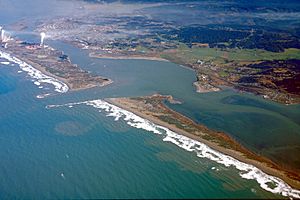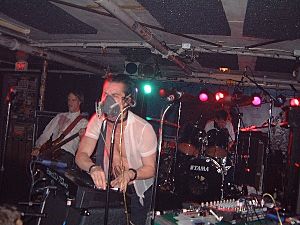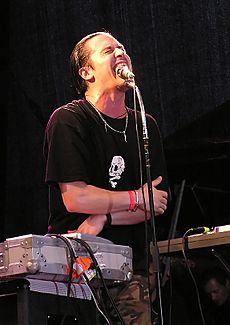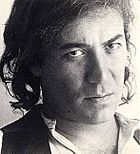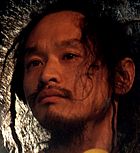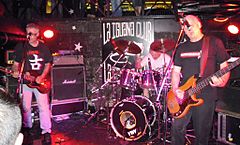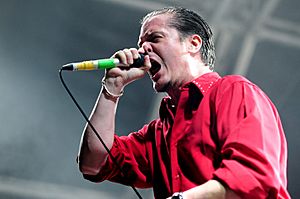Mike Patton facts for kids
Quick facts for kids
Mike Patton
|
|
|---|---|
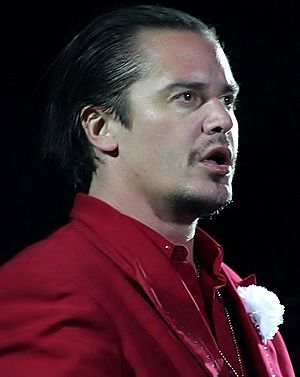
Patton in 2009
|
|
| Background information | |
| Birth name | Michael Allan Patton |
| Born | January 27, 1968 Eureka, California, U.S. |
| Genres |
|
| Occupation(s) |
|
| Instruments |
|
| Years active | 1984–present |
Michael Allan Patton (born January 27, 1968) is an American singer, songwriter, producer, and voice actor, best known as the lead vocalist of the alternative metal band Faith No More. Noted for his vocal proficiency, diverse singing techniques, wide range of projects, style-transcending influences, eccentric public image and contempt for the music industry, Patton has earned critical praise and influenced many contemporary singers. Patton is also co-founder and lead vocalist of Mr. Bungle, and has played with Tomahawk, The Dillinger Escape Plan, Fantômas, Moonchild Trio, Kaada/Patton, Dead Cross, Lovage, Mondo Cane, and Peeping Tom. Consistent collaborators through his varied career include avant-garde jazz saxophonist John Zorn, hip hop producer Dan the Automator and classical violinist Eyvind Kang.
He has worked as a producer or co-producer with artists such as Merzbow, The Dillinger Escape Plan, Sepultura, Melvins, Melt-Banana, and Kool Keith. He co-founded Ipecac Recordings with Greg Werckman in 1999, and has run the label since.
He saw his largest success with the group Faith No More; although they scored one US hit, they scored three UK top 20 singles. Patton is an outspoken, even mocking, critic of the mainstream music industry and has been a champion for non-mainstream music that he says has "fallen through the cracks."
Patton has been cited as an influence by members of Coheed and Cambria, Deftones, Five Finger Death Punch, Hoobastank, Incubus, Killswitch Engage, Korn, Limp Bizkit, Queens of the Stone Age, System of a Down, and Slipknot.
Contents
Early years
Mike Patton was born in Eureka, California, to a social worker mother and a physical education teacher father. Patton's home was strictly secular. During his first years, his family had an apartment in San Jose, California, in which they spent much time before they permanently relocated to Eureka. Patton says he has written recreationally for as long as he can remember. Due to his father's profession, Patton grew up as a sports enthusiast and practiced them regularly until his touring career began in 1989. One of his early musical memories was listening to his father's records by Earth, Wind & Fire and a Frank Zappa one, yet at the time they did not leave a significant impression on Patton. In elementary school he was a good student and athlete, but had very few friends due to his focus on getting good grades. As an "escape valve", he regularly asked his parents to drop him off at the movies, where he secretly watched slasher films and Star Wars, and the latter's soundtrack impacted him deeply. He and his bandmates have consistently credited their early years in Eureka, a relatively isolated city in the far north of California, to the intense curiosity that would drive their future career paths (Eureka being one of the few big towns between San Francisco and Portland, and surrounded by dense redwood forests). Although his family did not have an artistic background, Patton was thankful for the freedom they granted him which led him to music.
Patton studied at Eureka High School where he met bassist Trevor Dunn and later guitarist Trey Spruance, both members of its music theory class and jazz ensembles. Patton got to know Dunn through trading records and they bonded over their studiousness, sarcastic humor and disaffection. Both were part of the cover band Gemini that performed songs by popular heavy metal groups. They quickly gained interest in heavier styles and joined the thrash metal cover band Fiend, but were kicked out and subsequently recorded a death metal tape, with Dunn on vocals and Patton on the instruments. Although Patton was "pretty well-adjusted and well-liked by [his middle school] peers", he had a "hyper geek" personality and felt increasingly alienated from sportspeople; ultimately, he found a supportive environment in the death metal music scene where he shifted his focus from sports to art. He and Dunn also had punk friends and started to branch out to that subculture. On the other hand, Trey Spruance, who is a year younger, and drummer Jed Watts were members of Torchure, a Mercyful Fate-inspired band that had played with Patton's Fiend, and they formed another two-piece extreme metal band called FCA. Eventually, the four musicians joined up and established Mr. Bungle in 1984. In November, they performed its first show in the adjacent town of Bayside, California. Dunn, Spruance and Patton "pretty much hated everyone" at school and hung out alone next to the tennis courts outside campus. To pass the time, they often engaged in late night freighthopping, getting off at nearby towns or remote, wooded areas, and relying on hitchhiking to find their way home. While they disliked the cultural vapidness and degradation of the area, they appreciated their school teachers who nurtured their artistic interests; an English teacher turned Patton onto Marquis de Sade and The Painted Bird by Jerzy Kosiński, while Dan Horton, their music teacher, let them use the music room after school and even joined them as a temporary horn player at a show.
Patton enrolled in Humboldt State University, located in the nearby town of Arcata, California, to study English literature with plans to become a writer. He performed very well in college and wrote numerous short stories of varied genres, while at the time music was an enjoyable yet not-too-serious hobby for Patton. At Humboldt, Patton met his future band Faith No More during a 1986 show at a pizza parlor, where Mr. Bungle played numerous times. After the performance, Spruance, who had invited Patton to the show, gave drummer Mike Bordin Mr. Bungle's demo "The Raging Wrath of the Easter Bunny". From school to college, Patton also worked part-time at the only record store in Eureka until he joined Faith No More in 1988.
During the late 1980s, Mr. Bungle released a number of demos on cassette only: 1986's The Raging Wrath of the Easter Bunny, 1987's B**** of Chiley, 1988's G******** I Love America and 1989's OU818. The last three feature tracks that would later be included on their 1991 debut studio release.
Music career
Faith No More: 1988–1998; 2009–present
After the members of Faith No More heard Mr. Bungle's second demo tape in 1987, they approached Patton to audition as their lead singer in 1988. The band tried out more than fifteen singers to fill the role, including Chris Cornell from Soundgarden, but they settled on Patton in view of his versatility. In the next months they performed a few live shows together and Patton would be officially announced as their new singer in January 1989, replacing Chuck Mosley, which forced Patton to quit his studies at Humboldt State University. Mosley subsequently formed the bands Cement and VUA, and had several special "one-off" performances at shows with Faith No More and Patton before his death in 2017.
Faith No More's The Real Thing was released in 1989. The album reached the top 20 on the US charts, thanks largely to MTV's heavy rotation of the "Epic" music video, (which features Patton in a Mr. Bungle T-shirt). Faith No More released three more studio albums—Angel Dust, King for a Day... Fool for a Lifetime, and Album of the Year—before disbanding in 1998. In one interview, Patton cited what he perceived as the declining quality of the band's work as a contributing factor to the split.
On February 24, 2009, after months of speculation, Faith No More announced they would be reforming with a line-up identical to the Album of the Year era, embarking on a reunion tour called The Second Coming Tour. To coincide with the band's reunion tour, Rhino released the sixth Faith No More compilation, The Very Best Definitive Ultimate Greatest Hits Collection in the UK on June 8. The same line-up eventually released a new album called Sol Invictus in 2015.
Solo work and band projects: 1984–present
During his time in Faith No More, Patton continued to work with Mr. Bungle. His success in mainstream rock and metal ultimately helped secure Mr. Bungle a record deal with Warner Bros. The band released a self-titled album (produced by John Zorn) in 1991, and the experimental Disco Volante in 1995. Their final album, California, was released in 1999. The band ceased being active following the 1999–2000 tour in support of the California record, although their disbandment was only officially confirmed in November 2004. Mr. Bungle reunited in 2019 with three original members (Patton, Dunn and Spruance) plus drummer Dave Lombardo and guitarist Scott Ian to re-record its first demo from 1986 The Raging Wrath of the Easter Bunny, released on October 30, 2020.
Patton's other projects included two solo albums on the Composer Series of John Zorn's Tzadik label, (Adult Themes for Voice in 1996 and Pranzo Oltranzista in 1997). He is a member of Hemophiliac, in which he performs vocal effects along with John Zorn on saxophone and Ikue Mori on laptop electronics. This group is billed as "improvisational music from the outer reaches of madness". He has also guested on Painkiller and Naked City recordings. He has appeared on other Tzadik releases with Zorn and others, notably as part of the "Moonchild Trio" alongside Joey Baron and Trevor Dunn, named after Zorn's 2006 album on which the trio first appeared, Moonchild: Songs Without Words.
In 1998, Patton formed the metal supergroup Fantômas with guitarist Buzz Osborne (of The Melvins), bassist Trevor Dunn (of Mr. Bungle), and drummer Dave Lombardo (of Slayer). They have released four studio albums. In 1999, Patton collaborated with Japanese experimental musician Merzbow on the album She, released under the name Maldoror.
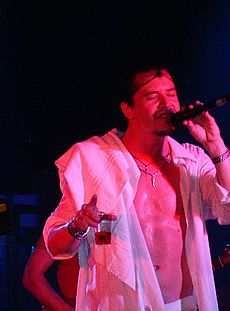
In 1999, Patton met former The Jesus Lizard guitarist Duane Denison at a Mr. Bungle concert in Nashville, and the two subsequently formed the band Tomahawk. Tomahawk's straightforward rock sound has often been compared to Album of the Year/King for a Day era Faith No More.
In 2001, he contributed vocals to Chino Moreno's group Team Sleep and released an album with the group Lovage, a collaborative project consisting of Patton, Dan the Automator, Jennifer Charles, and Kid Koala.
Patton performed vocals for Dillinger Escape Plan's 2002 EP, Irony Is a Dead Scene. That year, he joined violinist Eyvind Kang and his ensemble Playground to play the piece Virginal Co Ordinates at the AngelicA International Festival of Music in Bologna. The performance would be released as an album in 2003.
In 2004, Patton worked with Björk and the beat boxer Rahzel on the album Medúlla. That same year, Patton released the album Romances with Kaada and contributed vocals to the album White People by Handsome Boy Modeling School (Dan the Automator and Prince Paul). In 2005, Patton collaborated with hip hop DJ trio and turntablists The X-Ecutioners to release the album General Patton vs. The X-Ecutioners.
In February 2006, Mike Patton performed an operatic piece composed by Eyvind Kang, based on the 1582 work Cantus Circaeus by Giordano Bruno, at Teatro Comunale di Modena in Modena, Italy. Patton sang alongside vocalist Jessika Kenney, and was accompanied by the Modern Brass Ensemble, Bologna Chamber Choir, and Alberto Capelli and Walter Zanetti on electric and acoustic guitars. The singer remarked that it was extremely challenging to project the voice without a microphone. This performance was later released as the record Athlantis in July 2007, through Ipecac Recordings.
Patton's Peeping Tom album was released on May 30, 2006, on his own Ipecac label. The set was pieced together by swapping song files through the mail with collaborators like Dan the Automator, Rahzel, Norah Jones, Kool Keith, Massive Attack, Odd Nosdam, Amon Tobin, Jel, Doseone, Bebel Gilberto, Kid Koala, and Dub Trio.
In 2008, he performed vocals on the track "Lost Weekend" by The Qemists. In December 2008, along with Melvins, Patton co-curated an edition of the All Tomorrow's Parties Nightmare Before Christmas festival. Patton chose half of the lineup and performed the album The Director's Cut in its entirety with Fantômas. Patton also appeared as Rikki Kixx in the Adult Swim show Metalocalypse in a special 2 part episode on August 24.
In June 2009 Mike Patton and Fred Frith performed in Queen Elizabeth Hall, London, England as part of that year's Meltdown Festival.
On May 4, 2010 Mondo Cane, where Patton worked live with a 30-piece orchestra, was released by Ipecac Recordings. The album was co-produced and arranged by Daniele Luppi. Recorded in 2007 at a series of European performances including an outdoor concert in a Northern Italian piazza, the CD features traditional Italian pop songs of the 1950s and 1960s as well as a rendition of Ennio Morricone's "Deep Down".
On June 18, 2010, Patton performed the 1965 work Laborintus II by classical composer Luciano Berio in Amsterdam, along with the orchestra Ictus Ensemble and vocal group Nederlands Kamerkoor. This show would be released as an album on July 10, 2012. On October 8, 2016, Patton and Ictus Ensemble played this piece in Krakow, Poland, preceded by a performance of the album Virginal Co Ordinates the previous day, alongside its creator Eyvind Kang.
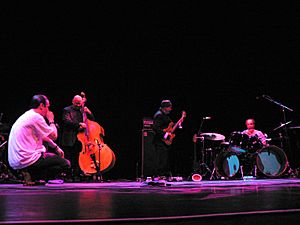
Patton is a member of the supergroup Nevermen, alongside Tunde Adebimpe of TV on the Radio and rapper Doseone (with whom Patton had previously collaborated on the Peeping Tom side-project). In 2016, the group released an eponymous debut album on Patton's Ipecac label.
In August 2017, Patton released an album with the band Dead Cross, a supergroup that includes Slayer and Fantômas drummer Dave Lombardo and Retox members Michael Crain and Justin Pearson.
On December 27, 2017, Patton performed his collaborative EP, Irony Is a Dead Scene, as well as a cover of Faith No More's "Malpractice," with the Dillinger Escape Plan live at the band's first of three final shows at Terminal 5 in New York City.
In May 2018, Patton performed two concerts entitled Forgotten Songs in Modena, Italy, with the American pianist Uri Caine. The setlists of the concerts varied and included songs from Olivier Messiaen, Elton John, Slayer, Violeta Parra, George Gurdjieff, among many others. They also performed a new song called "Chansons D'amour" from an album Patton would later release with French musician Jean-Claude Vannier, Corpse Flower of September 2019. The shows were recorded, but it is not certain if the material will get a release.
On January 25, 2020, Patton joined Laurie Anderson and Rubin Kodheli at the SFJAZZ Center for a performance based on the 16th century military manual Quanjing Jieyao Pian by Qi Jiguang.
In September 2021, Faith No More was scheduled to play shows but were cancelled due to Patton citing mental health reasons.
Other ventures
Film work
In 2005, Patton signed on to compose the soundtrack for the independent movie Pinion, marking his debut scoring an American feature-length film. However, this had been held up in production and may be on the shelf permanently. His other film work includes portraying two major characters in the Steve Balderson film Firecracker.
Patton provided the voices of the monsters in the 2007 film I Am Legend starring Will Smith.
He also worked on the Derrick Scocchera short film "A Perfect Place" for the score/soundtrack, which is longer than the film itself.
In 2009, Patton created the soundtrack to the movie Crank: High Voltage.
In the 2010 film Bunraku Patton voiced The Narrator.
Patton composed the soundtrack to the 2012 film The Place Beyond the Pines.
In 2016, Patton provided the voice to lead character Eddy Table in a short animated film, The Absence of Eddy Table.
In 2017, he scored the Stephen King movie 1922 for Netflix.
Video game work
Patton is an avid video game player, especially with PlayStation consoles. In 2007, he provided the voice of the eponymous force in the video game The Darkness, working alongside Kirk Acevedo, Lauren Ambrose and Dwight Schultz. Patton reprised the role in The Darkness II in 2012.
He also had a role in Valve's 2007 release Portal as the voice of the Anger Sphere in the final confrontation with the insane supercomputer, GLaDOS. He has another role in the Valve title Left 4 Dead, voicing the majority of the infected zombies. He also voiced Nathan "Rad" Spencer, the main character in Capcom's 2009 video game Bionic Commando, a sequel to their classic NES title.
On March 11, 2021, Patton lent his voice to a remake of the 1987 Teenage Mutant Ninja Turtles theme song that was released as the trailer for the videogame, Teenage Mutant Ninja Turtles: Shredder's Revenge.
Artistry
Voice, techniques and style
Throughout his career, Patton has utilized various different genres including, avant-garde, alternative metal, experimental, experimental rock, art pop, contemporary classical, funk metal, and thrash metal. Mike Patton's vocals touch on crooning, falsetto, screaming, opera, death growls, rapping, beatboxing, and scatting, among other techniques. While already a proficient singer, Patton is fond of manipulating his voice with effect pedals and diverse tools. This has been a prominent feature in his project Fantômas and contemporary classical performers. Critic Greg Prato writes, "Patton could very well be one of the most versatile and talented singers in rock music"; colleague Blake Butler called Patton "a complete and utter musical visionary and a mind-blowing and standard-warping genius." He has knowledge on multiple instruments as well.
Patton has garnered media attention for his reportedly wide vocal range, but when asked about his range in a 2019 interview, he said of past articles written about his vocal range: "I don't think that I have the biggest range. And even if I do, who cares! ... This is not like the Olympics of vocals. [laughs] I could make a record without singing a note, and I'll be happy with it."
Patton is enthusiastic about collaborating with other musicians, stating that "It is really what makes life interesting", but he only participates in projects he feels close to.
Phil Freeman of The Wire groups Patton with Tom Waits, Frank Zappa and Brian Wilson in what he calls 'California Pop Art' – artists from that area who adapted unconventional sources into their music and created pieces to then hire musicians capable of realizing them. Several writers have likened Patton to Zappa (as well as their bands Mr. Bungle and Mothers of Invention) because of the quantity of their work, wide-ranging influences and recurrent use of humor. Patton is averse to that comparison, but he admitted that one of the few records he enjoyed from his parents' collection was from Zappa. Freeman believes that besides superficial elements, their music does not hold many similarities.
Film scores by Patton have been described as blurring the lines between genres, as well as "radical", in a manner similar to popular musicians such as Trent Reznor and Atticus Ross who turned to the audiovisual medium without any strict adherence to its orchestral tradition. On his method of composition for other musicians' pieces and filmmakers, Patton said that the most important quality is to remain flexible and open to any style, as well as to always follow the vision of the author.
Vocal writing and lyrics
Patton bases his vocals on what "the music dictates", whether that is using his voice in a traditional way or as "another [instrument]." Both with orchestras and smaller bands, the singer follows a serial, painstaking approach on his writing. Although he has performed with many improvisation and game ensembles through his career, Patton rarely composes vocals through jam sessions. His compositions are preceded by the study of the instrumentals, where he analyzes every instrument and their specific parts, and afterward focuses on "blending [his voice] into the band" rather than being at the forefront of the pieces. Patton feels that the best recordings have the vocals "a little buried in the mix" as they interact with the other instruments. Usually, his first composition step is to find the lead melody of a piece, either vocal or otherwise, imagining notes and sounds on top of it. After that his writing naturally progresses, e.g. by employing a "third or fourth [harmony]" or "whatever [else] needs to be done". Patton is inclined to produce dense overdubs that include numerous vocals or instrumentations in single passages. When asked about the unorthodox use of his voice – drawing on diverse techniques and effects, or eschewing lyrics, Patton remarked: "The voice is an instrument. No rules, just part of the music."
Former bandmate William Winant singled out Patton's immediacy to concretize musical ideas he has in his head. Faith No More bassist Billy Gould observed his reaction to the backbone of the songs from The Real Thing and concluded: "[Patton] was trying to figure us out at first, ... But he has this key to understanding music on a real gut level, and his ideas honestly made these songs even better."
Patton creates lyrics after hearing the instrumentals and, in the same way as the vocals, he approaches them depending on "what the music needs". His songwriting takes a phonetic perspective instead of a literal one, making sounds paramount – "the music tells the story", he says. As soon as he creates the melodies, he generally seeks words that sound the most similar to what he heard in his head. On the other hand, when working thematically, Patton says that each song is usually a character sketch acted out by him, "trying to appropriate their [respective] psycholog[ies]", and does not make them autobiographical. Before writing, Patton tends to read books about the specific topic he wants to address and then fits it into "stolen ideas from other musicians." Journalists highlight the marked deromanticization by Patton on his own songwriting (he once compared it to "brushing [his] teeth"), yet, in the 1990s, he either said or hinted that at least a few songs came from his personal experiences. Regardless of the extent to which Patton's statements on his lyrics are accurate, to Cammila Albertson at AllMusic his self-deprecating attitude is "self-aware" and, at least partly, a reaction to the self-importance of people in the music industry, manifested more clearly in his parody of rock and rap clichés in the lyrics of "Mojo" by Peeping Tom. In a 1993 Faith No More interview, Patton elaborated:
I wanna be myself, not say what I am. ... I guess the idea is that, as a singer, you're supposed to inherit a lot of responsibilities, but I never thought of myself as that important. None of us are that type of artist.
In some projects such as much of Moonchild Trio and Fantômas, he has avoided lyrics completely in favor of preverbal sounds, because, in these cases, he deems language "distracting information". Although many of these verses do not have concrete meanings, Patton emphasizes that they are not emotionally void, in the same way as neither a painting without explanation notes is. For him, records are akin to an "adventure" or scenes from a movie, and he enjoys that people interpret them in their own way, corresponding to how he himself listens to other music. Patton's free-form approach, both vocally and lyrically, mirrors those of singers Demetrio Stratos and The Boredoms' Yamantaka Eye.
By the time of 1989's The Real Thing, Patton was studying English literature in college whereas Faith No More was an already established band, circumstances that led him to write its lyrics as if they were a "school project".
Music development
As a young child Patton had an aptitude for the recognition of different sounds and, according to him, his parents became aware that he imitated bird vocalizations. This prompted them to give him a flexi disc of vocal exercises, "like guys that could make odd sounds", which became one of his favorite records but without understanding its purpose at the time. He realized the potential of his voice at the age of eight or nine by doing "things to get attention" at school.
Mike Patton is mostly a self-taught musician and cannot read or write notation. He has perfect pitch. His production methods also grew from him figuring out how to accomplish the sounds he tried to convey every time he was in his studio. In the beginning, Patton mimicked and drew from all the singers whose music he admired. Only once Patton started to continually record himself and listened to these recordings, he was able to establish a foundation to shape his skills. Thereby, he points up that "hearing more", both to his and other music, has been his most important education. Since he began to improvise with saxophonist John Zorn in 1991, along with his discoveries of Demetrio Stratos and Diamanda Galás, Patton started broad explorations into extended vocal techniques and the limits of his voice, with him trying to match Zorn's "immense, bullheaded" range. Many of his vocal deeds and exercises arisen from improvisations were documented on the 1996 album Adult Themes For Voice. Around the period that Patton moved to Italy, he became acquainted with the singing method of opera teacher Nicola Vaccai, which he studied autodidactically for years, furthering his repertoire more. At the time he also delved into Bel canto, a florid Italian singing tradition, as can be seen in his operatic performances and also in Mondo Cane.
Patton's views on creating music are somewhat similar to those of Brian Eno, a self-professed "non-musician", with the difference that Patton excelled at his main instrument and mastered at least the rudiments of several others. Although Patton disregards the preponderance of theory in favor of doing, he still attributes part of his development to working with learned musicians: when Mr. Bungle formed in 1984, he was "fascinated" with his friends Trey Spruance and Trevor Dunn, both theory and jazz students at school, because they knew more about music than him, and decided to "follow their lead." Afterward, at Humboldt State University, his bandmates Dunn, Spruance, Danny Heifetz and Clinton McKinnon were all majoring in music while Patton studied English literature. Spruance highlights the great music resources in Humboldt's library, where he spent a lot of time studying, and the band rehearsed at the same place as the college big band, in which the four of them played. Additionally, Patton—along with Heifetz—was tutored on percussion by professor Eugene Novotney.
Composer and saxophonist John Zorn, who met Patton in 1990, is credited with teaching him "many things", such as vocal improvisation when performing with an ensemble. In 2006, Patton spoke about their relationship: "I've been incredibly fortunate to have a friend like that — who is also a peer and a mentor". Some of his recording sessions with Zorn as conductor were so arduous that the singer passed out.
Influences
As regards his influences, Patton stated: "You should be able to draw inspiration from any and everything. There should be no limits, it's fundamental. A lot of people listen to music that I make and [do not understand why my songs are so eclectic. But] that's the way I listen to music! ... That's the way I see the world and that's how it comes out of me. ... The deeper that well [of inspiration] is and the more places you can find it, the better." Detailing his composition process, Patton once paraphrased the T. S. Eliot quote, "Good artists copy; great artists steal."
Early influences
Patton's first bands in high school played heavy metal and by the start of Mr. Bungle the frontman was immersed in death metal and hardcore punk. In this period his favorites groups included Venom, Possessed and Sodom. In terms of punk, he was a big fan of The Exploited and straight edge band 7 Seconds. The band's second and third demos shifted its sound to ska and funk, and the last one of 1989 incorporated a wide variety of genres. Patton considers his work at a record store as crucial for his and Mr. Bungle's evolution: upon his arrival, he "devour[ed]" extreme metal and punk rock music, all the while his coworkers introduced him to diverse artists who ranged from rap to reggae to folk rock and other genres.
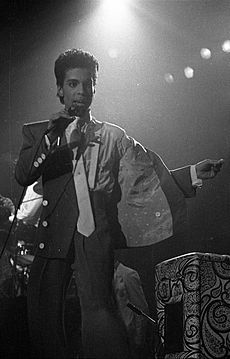
Before the release of their 1986 debut The Raging Wrath of the Easter Bunny, Dunn and Patton had got hold of ska- and funk-infused bands such as Oingo Boingo, Fishbone, Red Hot Chili Peppers, Camper Van Beethoven, E.U. and others. Spruance said that the catalyst to their progression was their attendance to an October 1986 show by funk rock band Fishbone, as they were one of the few renowned hard rock-fusion groups that played in their hometown of Eureka. These musical findings spurred Mr. Bungle's interest in tearing down the walls between opposite styles, and challenging the seriousness of the extreme metal community. The theatrics and overexpression of certain notes of Oingo Boingo's Danny Elfman paralleled those of Patton, while his late 1980s nasal rapping drew comparisons to Red Hot Chili Peppers' Anthony Kiedis. This period of Mr. Bungle also echoes the lighthearted youthfulness and wacky videos by British ska pop band Madness, whose song "House of Fun" reminisces "Carousel" by Mr. Bungle musically. Perhaps Patton's biggest influence by then had become Prince, evident in the soulful inflections and crafty squeals throughout his first studio albums with both Faith No More and Mr. Bungle. Throughout those years the band still had broad musical interests that included new developments in heavy music, and they constantly traveled to San Francisco in order to attend shows and buy more obscure metal records. Patton also began his connections with easy listening through singer Sammy Davis Jr. Furthermore, he came under the influence of R&B singer Sade on his arrival to Faith No More, reflected in later songs such as "Evidence".
He pinpoints his discoveries of "extraordinary" Motown singers and some records by Frank Zappa as landmarks at his record store job. After a few years working there, Patton was allowed to commission albums to have them on sale, subsequently ordering "the craziest" records he was aware of from diverse styles, with the secret intention of taking those records into his house to make copies of them that he and his Mr. Bungle bandmates would listen to. This rapidly led their music tastes to grow.
Vocal influences
Asked about his influences and favorite singers in 1992, Patton said "A lot of people, I don't even know [where to start]", but among them mentioned Diamanda Galás, Frank Sinatra, Blixa Bargeld from Einstürzende Neubauten, H.R. from the Bad Brains, Chet Baker, Elton John and Obituary's John Tardy. Several reviewers have noted similarities between his most adventurous works and the music of Galás, and the solo performances and screams of Bargeld. The frontman expresses much admiration for Sinatra's musicality, owning rare live records and outtakes from him, and considers unfortunate that the crooner's private life overshadowed his artistry. Some authors observed that Bad Brains' H.R. presaged the dynamic delivery of Patton.
One of Patton's biggest influences was Greek-Italian singer and researcher Demetrio Stratos, leader of Area, who studied the limits of the human range and recorded several vocals-only albums that Patton examined. Stratos died unexpectedly amid his research, aged 34, and years later writer Anthony Heilbut referred to Patton as his "most famous heir". The surreal vocals of Yamantaka Eye from The Boredoms and Hanatarash inspired the lyric-less compositions by the singer as well, and the former had also played with Naked City before Patton.
Another influence is Tom Waits; Angel Dust included the Waits-inspired song "RV", and at that time Patton began to use a megaphone both on stage and in the studio. The 1970s catalog of Stevie Wonder include some of the records that impacted Patton the most vocally, such as The Secret Life of Plants. In different incarnations, he has covered the Stevie Wonder songs "Sir Duke" and "They Won't Go When I Go".
In 2019, he cited the spoken word-esque lyrical style of Leonard Cohen as inspirational, as well as the voice and note placement of Serge Gainsbourg, in addition to the writing of Bob Dylan. Patton disregarded this type of musician when he was younger, until he eventually "hear[d] new things" in them.
Other influences
In 1992, he cited Nomeansno and The Residents as influences. The Quietus pointed out "Patton's love of the Cardiacs, and musical digression" in general as well. Patton held in high regard the Super Roots EP series by Boredoms, along with the albums A Fierce Pancake by Stump, Ozma by Melvins and Drop Dead by Siege. He was a big admirer of industrial metal band Godflesh, and invited the guitarist Justin Broadrick to join Faith No More after the departure of Jim Martin in 1993. The Young Gods informed his and Faith No More's later use of samples.
By 1992, Patton's favorite genre had become easy listening, and years later he named composer and arranger Les Baxter as the main influence on one of his film scores. In 2005, he stated: "The orchestration in that music is so dense and so complex and so amazing, if you can get beyond the kitsch. And I can do that in 30 seconds flat. ... I hear new stuff in there every time I listen." Besides Baxter, orchestral pop composer Burt Bacharach is a major influence on Patton's writing, and he has expressed his desire to work with Bacharach. Additionally, the singer was "besotted" with the music of Jean-Claude Vannier after discovering his arrangements for Serge Gainsbourg, and the two went on to collaborate in 2019.
In 1988, Patton mentioned actor and comedian Steve Martin as an influence on Mr. Bungle, and he later stated that he felt identified with him. He has credited disco band Village People for his use of irony and stage costumes, believing that "a lot of people [did not] understand [the band's deliberate sarcasm]". Mr. Bungle covered "Macho Man" as early as 1985 (its second active year). Another ideological influence was shock rock singer GG Allin, who Patton considered "the musician who never sold out" and admired that "he lived and died for what he believed in".
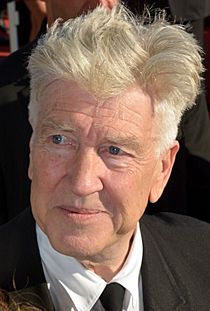
Films and books have informed Patton more than any other medium. The eclecticism of both Ennio Morricone's scores for Dario Argento, and Jerry Goldsmith, were major sparks for his interest in soundtracks. Patton shows a deep appreciation for movies that deal with inner, psychological uncertainty and distress, rather than outward shock value or glitz. Important film pieces to him include Rosemary's Baby by Krzysztof Komeda, In Like Flint by Jerry Goldsmith, The Godfather by Nino Rota, Kwaidan by Tōru Takemitsu, Under the Skin by Mica Levi, The Birds by Oskar Sala, and The Exorcist. Patton has expressed his admiration for director David Lynch, and many publications describe the surrealism in some of his music, especially in Disco Volante and California by Mr. Bungle, as "the musical equivalent of a David Lynch movie." He is a devotee of Morricone's catalog, lamenting that his bombastic Westerns eclipsed his more experimental or strictly classical oeuvre, and in 2005 he commissioned a compilation of the lesser-known soundtracks by "E Maestro" that was released on Patton's label. Morricone's death in July 2020 "weighed heavily on" the singer.
Other musical influences are experimental hardcore band Melt-Banana, which toured with Mr. Bungle in 1995, post-rock band Sigur Rós, country singer-songwriter Willie Nelson, the recording of vocals by João Gilberto, composer Olivier Messiaen, especially his transcriptions of birdsongs, and cartoon music composer Carl Stalling, who was a shared point of reference with John Zorn, whose PhD thesis was on him. The singer expressed fondness for Mauricio Kagel's "negation of opera and the whole tradition of music theater", and Mark Mothersbaugh's music in the Crash Bandicoot game series.
Patton has a fascination for the underground scene in Japan, as suggested in the influence of the Boredoms and Melt-Banana on his music, his collaborations with Merzbow and Otomo Yoshihide, and the Ipecac signings of zeuhl band Ruins and ambient duo Yoshimi & Yuka. In 2006, Patton remarked: "Japanese musicians seem less worried about the way things should sound and look. That involves more creative freedom. They are unique."
Live performances
Reviewing Patton's live performances, The Believer noted that "his gestures are as anarchic as his vocal sounds", while Revolver highlighted his "maniacal and dapper stage presence". As a rock frontman, Patton regularly communicates with his audiences, often through dry humor and sarcasm.
When he joined Faith No More, Patton was "wound up tight" about matching his performances with the band's attitude. The singer began, among many other things, to front flip onto the stage and land on the floor, to somersault into the crowds, as well as into Bordin's drum kit.
Personal life
Relationships
Patton married Cristina Zuccatosta, an Italian artist, in 1994. The couple divided their time between San Francisco and Bologna, Italy. The couple separated in 2001, but later reconciled. Patton has referred to her as his "best friend" and says that "she probably understands [him] more than [he]" himself does. He has no children. Patton enjoys his privacy and maintains few deep relationships in his life. In 2002, Patton admitted that his hectic schedule had hindered some of his personal relationships, but nonetheless he emphasized that music is his priority.
Patton has been known to have a long-time friendship with drummer Dave Lombardo originating from the two collaborating during the formation of Fantômas in 1998. Patton has also been known to be friends with System of a Down frontman Serj Tankian. One of Patton's friends is actor Danny DeVito, who continually goes to concerts by Patton. They met after DeVito and his son attended a Fantômas show at the 2005 Coachella Festival.
Health
In 2022, Patton disclosed that he was diagnosed as suffering from agoraphobia, which resulted in the cancellation of Faith No More and Mr. Bungle performances in 2021.
Interests and hobbies
Patton owns a massive record collection and, as of 2005, he regularly traveled to Japan with John Zorn to buy albums. Patton is not "so sensitive to musical climates" and believes that some of the best art tends to "fall through the cracks", thus he invests a considerable amount of time in search of non-mainstream artists. This was one of his reasons for the establishment of Ipecac Recordings. In 1999, Patton told: "I like going into some place like [record store] Amoeba and saying 'O.K. what's gonna change my life today?'" Patton's favorite moment during a promotional cycle in 1995 was to spend $20,000 on a jazz record binge with his bandmate Bordin in Paris. In 2010, he wrote a testimonial for Record Store Day as support for those independent businesses, calling them his "candy shops!"
Patton is a foodie. He owns several restaurant books and while on tour he likes to try different cuisines. His record Pranzo Oltranzista revolves around futurist cooking and he has given thematic interviews about food. Meeting up with friends over a meal is his main social activity besides music.
Since childhood, Patton has been an avid fan of basketball team Los Angeles Lakers. He is also a baseball fan, which in the past he considered "a guilty pleasure." Patton supports the Italy national football team.
In between tours, Patton practiced swimming and weight training.
Other
Patton's numerous projects and constant touring have led him to be widely identified as a "workaholic". Patton has kept around three projects going on simultaneously throughout the years. By 2006 he did not go on vacation, but says that his workflow is natural for him and does not "feel comfortable unless [he has] got a few unfinished things".
Until 2001, Patton owned a home in Bologna and became a fluent speaker of Italian. These events tied him closely to Italian culture and its popular music of the mid-20th century. He was also conversational in Spanish until the 1990s and still understands it. In addition, he spoke Portuguese slang.
Legacy
A list published by Consequence of Sound based on vocal range acknowledged Mike Patton as "the greatest singer of all time" in popular music. Before the disbandment of Faith No More in 1998, Patton was already highly respected by colleagues and listeners, and this continued with his multiple experimental releases that ensued it. In terms of influence, PopMatters regards him as one of the two most important rock frontmen of the 1990s alongside Kurt Cobain. Nonetheless, Patton downplays his prominence with light-hearted self-deprecation, and was very critical of his earlier work.
The versatility and skill of Patton's vocals on the first Faith No More and Mr. Bungle albums were "groundbreaking", features that, along with the experimental rock instrumentations of his bandmates, inspired a generation of musicians that came after him. Although Patton could easily have capitalized on any of those records after their release, critics extol that he kept reinventing himself and constantly looking for new approaches throughout the years. Several authors have called him a "Renaissance man". Writing about the multifaceted endeavors of Patton, Robert Barry stated:
The world he moves in is occupied as much by academically-minded and conservatory-trained musicians as punks and freaks. ... [But his diversity] should not be dismissed as superficial po-mo posturing. In fact it could be compared to that of Olivier Messiaen. ... "There is nothing superfical about Messiaen's eclecticism," said conductor Pierre Boulez, and "Just as we can speak of eclecticism in his choice of composers, so his actual style of writing – juxtaposing and superimposing rather than developing and transforming – may be called eclectic." Words that could just as easily have been written about Patton.
Patton has often been credited as an influence to nu metal, a form of alternative metal spearheaded by bands such as Korn and Limp Bizkit in the late 1990s. He has been less than enthusiastic about being linked to such bands. A reviewer at The Quietus opined that, notwithstanding Faith No More's far-reaching legacy, the most valuable contribution of Patton has been using his platform "to become one of the most potent driving forces in avant-garde and alternative music", through his diverse projects and collaborations, and the experimental artists he has signed to Ipecac Recordings.
In addition to his towering legacies with Faith No More, Mr. Bungle and Fantômas, numerous artists cite Mike Patton directly as an inspiration. Prominent singers such as Chino Moreno (Deftones), Brandon Boyd (Incubus), Ville Valo (HIM), Jacoby Shaddix (Papa Roach), Greg Puciato (The Dillinger Escape Plan), Jesse Leach (Killswitch Engage), Ivan Moody (Five Finger Death Punch), Justin Pierre (Motion City Soundtrack), Daryl Palumbo (Glassjaw), Howard Jones (Killswitch Engage), Claudio Sanchez (Coheed and Cambria), Tommy Rogers (Between the Buried and Me), Daniel Gildenlöw (Pain of Salvation), Doug Robb (Hoobastank), Tommy Vext (Divine Heresy), Hernan Hermida (S****** Silence), Dimitri Minakakis (The Dillinger Escape Plan), Mike Vennart (Oceansize), Spencer Sotelo (Periphery), CJ McMahon (Thy Art Is Murder) and Kin Etik (Twelve Foot Ninja) have all cited Patton as their primary influence.
Devin Townsend proclaimed in 2011: "Angel Dust into Mr. Bungle changed every singer in heavy music. Patton is a living treasure." Artistically, he has been named the biggest influence for Slipknot, Mushroomhead and Igorrr, and a major one on Josh Homme (Queens of the Stone Age), Serj Tankian (System of a Down) and The Avett Brothers.
Discography
Studio albums
- Adult Themes for Voice (1996)
- Pranzo Oltranzista (1997)
- Mondo Cane (2010)
Selected filmography
- 1990 – Live at the Brixton Academy, London: You Fat ... by Faith No More (VHS)
- 1993 – Video Macumba – Short film compiled by Mike Patton containing abstract and extreme footage
- 1993 – Video Croissant by Faith No More (VHS) Released in 1993 it features some of the band's music videos up to that date.
- 1998 – Who Cares a Lot: Greatest Videos by Faith No More (VHS)
- 2002 – A Bookshelf on Top of the Sky: 12 Stories About John Zorn
- 2005 – Firecracker – Frank/David
- 2007 – Kaada/Patton Live – Live performance DVD
- 2007 – I Am Legend – Creature Vocals (voice) (credited as Michael A. Patton)
- 2008 – A Perfect Place – Short film soundtrack by Patton (Released with film as CD/DVD special edition)
- 2008 – Live from London 2006 – Live DVD release of a performance by the Fantômas/Melvins Big Band in London on May 1, 2006
- 2008 – Metalocalypse – Patton voices the character of reformed rocker Rikki Kixx on episodes "Snakes n Barrels II" part one and part two. This special 2 part, half-hour presentation aired on Adult Swim August 24, 2008.
- 2009 – Crank: High Voltage – Film Score
- 2010 – The Solitude of Prime Numbers – Film Score
- 2010 – Bunraku – Narrator
- 2012 – The Place Beyond the Pines – Film Score
- 2016 – The Absence of Eddy Table – Voice of Eddy Table
- 2017 – 1922 – Film Score
Video game voice work
- 2007 – The Darkness – Voice of The Darkness (Starbreeze Studios)
- 2007 – Portal – Voice of the Anger Core (Valve)
- 2008 – Left 4 Dead – Infected voices, Smoker, Hunter (Valve)
- 2009 – Bionic Commando – Voice of Nathan Spencer – the Bionic Commando (Capcom)
- 2009 – Left 4 Dead 2 – Infected voices, Smoker, Hunter (Valve)
- 2012 – The Darkness II – Voice of The Darkness (Digital Extremes)
- 2016 – Edge of Twilight – Return to Glory – Vocals for Lithern and Creatures (FUZZYEYES)
See also
 In Spanish: Mike Patton para niños
In Spanish: Mike Patton para niños


